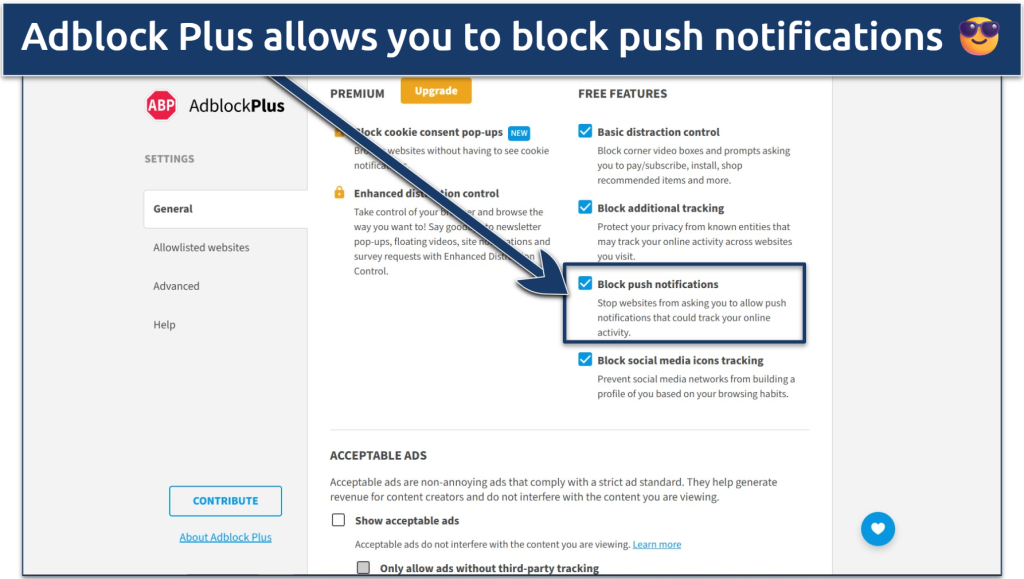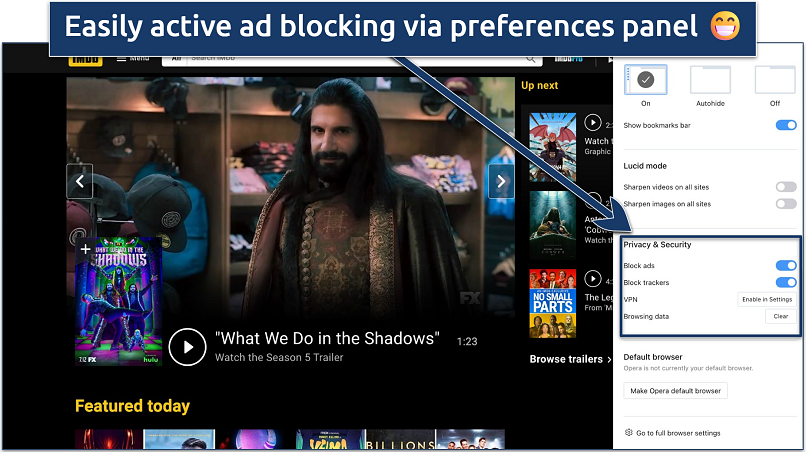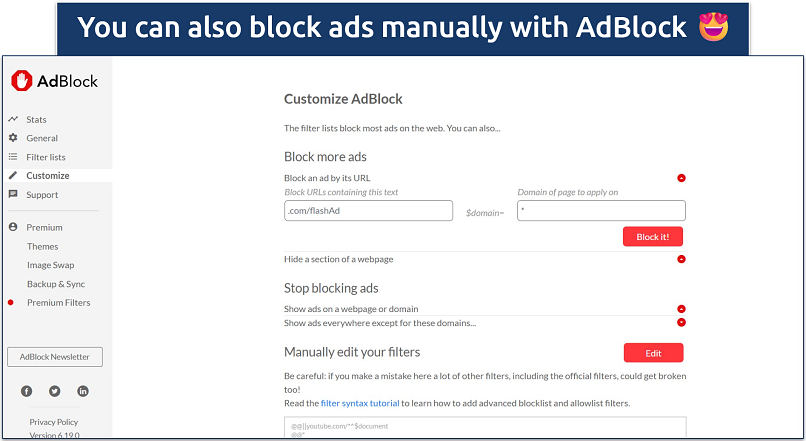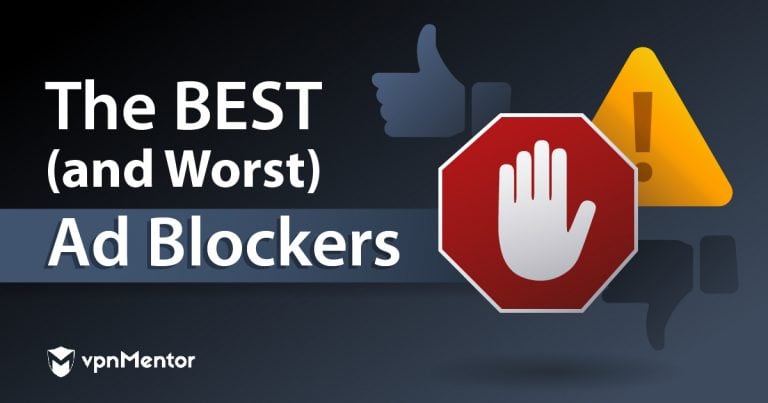5 Best Ad Blockers in 2025 — Apps and Browser Extensions
- Pro Tip: Use a VPN With an Ad Blocker for Increased Online Privacy
- Best Ad Blockers — Full Analysis (Updated 2025)
- Quick Comparison Table: Best Ad Blocker Features
- What Are the Worst Ad Blockers?
- An Ad Blocker Is Not a Security Product — How To Stay Safe Online
- Extensions vs Apps? Which Ad Blockers Are Better?
- Our Methodology for Selecting the Best Ad Blockers
- FAQs on the Best Ad Blockers
- Get the Best Ad Blocker Today
Most ad blockers are ineffective and often fail to block pop-ups, banners, and video ads. Others can even compromise your online security by tracking and selling user data or infecting users with malware.
What is the best ad blocker? AdGuard Adblocker is one of the most effective ad blockers we tested, stopping 90% of ads. After my team and I tried 30+ ad blockers, the best ones offer practical ad-blocking tools that eliminate annoying ads and protect your online privacy. Most of the ad blockers on my list can also stop in-video ads, and some are free.
Short on Time? Here Are the Best Ad Blockers in 2025
- AdGuard AdBlocker — Budget-friendly ad blocker with apps for all major operating systems and browsers.
- Brave Browser — Free, private browser with built-in ad and tracker blocking and an ad-free search engine.
- Adblock Plus — One-click settings to block ads and prevent social media sites from tracking your data.
- Opera Browser — Faster load times on webpages with the browser’s built-in ad blocking.
- AdBlock — An effective ad blocker with an Android app that removes most ad types.
Pro Tip: Use a VPN With an Ad Blocker for Increased Online Privacy
Ad blockers help improve browsing by removing intrusive ads, but they're insufficient for online security. In addition, Google's new Manifest V3 update is designed to undermine ad-blocking extensions. As a result, no extension will block all Google ads. Ad blockers only filter web content in your browser. They don't encrypt your internet traffic, hide your IP address, or protect other apps on your device.
Using an ad blocker and a VPN (Virtual Private Network) is best. A VPN creates an encrypted tunnel for your internet data, so ISPs, hackers, and surveillance systems can't see your activity. VPNs also mask your real IP address, protecting your identity and making it harder for websites and attackers to track or target you. Premium VPNs have built-in ad blockers and follow strict no-logs policies for improved online privacy.
Editor's Note: Transparency is one of our core values at vpnMentor, so you should know we are in the same ownership group as ExpressVPN. However, this does not affect our review process.
Best Ad Blockers — Full Analysis (Updated 2025)
1. AdGuard AdBlocker — Highly Effective Ad Blocking Apps And Browser Extensions
| Best Feature | The best standalone ad blocker with browser extensions, including Safari |
|---|---|
| Ease of Use | The extension downloads almost instantly, while the app only takes 3 minutes |
| RAM required | The app needs 150MBs, while the extension only needs a couple |
| Price | Free browser extensions are available on some platforms, like Android. Paid plans start at $2.49/month |
Unlike most ad blockers, which offer only a Chrome extension, AdGuard provides full Windows, Mac, iOS, Android (including TVs), and Linux apps. These apps block annoying ads on your browser and other apps. During our tests, it successfully blocked 90% of ads, including pop-ups, banner ads, and newsletter ads.
AdGuard also offers extensions for popular browsers, including Safari. The Safari extension was less effective than the Chrome one, but it still worked well, blocking all ads on Forbes, The Guardian, and other websites. It also successfully blocked in-video ads on YouTube — we rarely saw any ads while streaming content on the platform during tests.
Even sponsored links on Google searches were effectively blocked by AdGuard. However, this setting is customizable, and you can easily switch it off to check for promotions and offers. AdGuard's parental controls allow you to block or enable selective websites and prevent downloading all.exe files. You can also set third-party cookies to self-destruct after a chosen period.
I initially had concerns that AdGuard was founded in Moscow, since Russia is known to have intrusive data monitoring laws. However, it has now relocated to Cyprus. You need a subscription to use AdGuard apps, but there's a 60-day money-back guarantee to test it risk-free.
2. Brave Browser — Private Browser With Built-In Ad Blocking
| Best Feature | Uses the privacy-friendly DuckDuckGo as its default search engine |
|---|---|
| Ease of Use | Brave can be downloaded and used in less than 5 minutes, depending on your network speed |
| RAM required | 400MBs for Windows, but it can take more space with temp files and profiles |
| Price | Free forever |
Brave Browser has built-in ad and tracker blocking and does a great job of removing ads. In our tests, it blocked 84% of ads and trackers, nearly as many as AdGuard. It also somewhat prevented ads on YouTube, with occasional pop-ups and video ads slipping through its defenses.
This browser is based on Chromium and uses the more privacy-friendly DuckDuckGo as its default search engine. This search engine is famous for not running sponsored or third-party ads. Plus, Brave and DuckDuckGo don’t track your browsing, so you know your data won't be sold or used for targeted ads, unlike other popular browsers, like Chrome.
You can create a customized feed to get the latest news from your favorite websites. This also prevents you from seeing dozens of ads on that source’s website. You can also browse onion websites with Brave browser’s Private Window with Tor.
The only con I could find with Brave is that it has an ad program that shows ads to users. However, you will only see the ads if you want to, and you can earn up to 70% of the ad revenue that Brave receives from advertisers.
3. Adblock Plus — An Open-Source Blocker That Can Prevent Social Media Tracking
| Best Feature | A simple yet effective ad blocker that specializes in protecting your social media apps |
|---|---|
| Ease of Use | Quick to download from the extensions store and straightforward to use |
| RAM required | Just a couple of MBs, so it doesn’t put much of a load on your system |
| Price | Free forever with a premium plan starting from $4/month |
Adblock Plus can prevent social media websites from tracking your data so that customized profiles can be created. It is also open-source, meaning anyone can view its code and suggest improvements. In our tests, it blocked 72% of ads and trackers, including YouTube video ads, floating pop-ups, and self-promotional sidebar ads.
 You can choose distraction control or block additional tracking in 1-click
You can choose distraction control or block additional tracking in 1-click
It has a simple interface, and you can easily customize most settings with just one click. In addition to traditional ad blocking, Adblock Plus has a Block element feature, which you can use to block sections or ads manually on a webpage. With its Language Filters, you can also choose to block ads from a specific language.
Adblock Plus's premium version offers additional blocking capabilities against cookie consents, floating plus self-playing video ads, and newsletter ads. It has a 60-day money-back guarantee to test all the features.
4. Opera Browser — Integrated Privacy Features To Improve Website Load Times
| Best Feature | A browser with integrated ad and tracker blocking for speedy internet browsing |
|---|---|
| Ease of Use | Can be downloaded and used in under 7 minutes, depending on your network speed |
| RAM required | The installation package is just 2.5MBs, but the software can take around 1GB |
| Price | Free forever |
Opera is a smooth and user-friendly browser with a built-in ad blocker. Its privacy protection can improve your website load times, and during tests, it blocked 64% of ads and trackers. Opera stopped banner, sidebar, and video ads on Fandom.com, Twitch, and YouTube.
 This panel also allows you to connect to the VPN
This panel also allows you to connect to the VPN
Its integrated messages allow you to use all major messengers in a browser window without ads. Adjusting your settings is also pretty straightforward. All I had to do was click the blue shield icon in the search bar to open the Privacy Protection dropdown.
Opera includes a free VPN but is slow and offers limited servers. During tests, it reduced our speeds by as much as 75% compared to our base speed (this was much slower than Brave’s built-in VPN). It also uses Google as the default search engine, which allows sponsored links and collects a lot of data via ads and trackers, so it’s not great for privacy.
5. AdBlock — Compatible With Mobile To Prevent Ads on Your Phone
| Best Feature | Browser extensions plus apps for iOS and Android smartphones |
|---|---|
| Ease of Use | Works right out of the box when installing the extension from the AdBlock website |
| RAM required | Both the extension and apps are only a couple of MBs |
| Price | Free forever |
Unlike most ad blockers, AdBlock is available for mobile and major browsers. It also has the same interface across all the supported platforms, so you don’t need to adjust to a new interface on different devices. Please be aware that this service is different from AdBlock Plus.
 It also allows you to hide a specific section of a webpage
It also allows you to hide a specific section of a webpage
Mobile compatibility is the top reason AdBlock made my list. It allows non-intrusive ads by default. Despite all these features, it could only stop 31% of ads and trackers. It’s one of the more popular blockers, which is probably why many people think ad blockers don’t work.
Quick Comparison Table: Best Ad Blocker Features
The most effective solution to content blocking is a service with good ad and tracker protection. I used an online tool to measure the percentage of ads and trackers prevented using each ad blocker. Below is the list of how effective all these ad blockers perform.
What Are the Worst Ad Blockers?
Ad blockers that seem trustworthy could be tracking your data. Some blockers have even been caught embedding malware on user devices. For these reasons and more, I advise against using the following blockers:
- uBlock. uBlock has been known to modify cookies so it can track its users. It has been removed from the Chrome Extensions store. uBlock should not be confused with uBlock Origin, which has been removed from the extensions store after implementing the Manifest V3 update.
- Ghostery. Not a very effective blocker and has profited from selling user data. Its website is down at the time of writing, so I couldn't check its privacy policy.
- Privacy Badger. Like Ghostery, Privacy Badger isn’t really an ad blocker because it only blocks trackers. Its privacy policy states, “Where possible, we take steps to limit the ability of third parties to retain data about our users”, which doesn’t fill me with confidence.
The worst ad blockers are generally free, and the same is true of VPNs. Like shady ad blockers, free VPNs often steal your data and offer limited security. However, if you’re on a budget and you’d like to find a free option to protect your data, look at this list of free VPNs you can trust.
An Ad Blocker Is Not a Security Product — How To Stay Safe Online
Ad blockers are not designed for security and don't hide your IP address, so your real location and identity can be exposed to websites, advertisers, and malicious actors. To stay safe online, I recommend the following:
- Don’t click on ads. Always avoid clicking on intrusive ads (pop-ups, banners, in-videos, etc.) as they can be injected with malware or redirect you to malicious websites.
- Use an Antivirus. Antivirus software scans downloaded files and deletes harmful ones. They can also delete malicious files that start to download automatically, even when you accidentally click on pop-ups.
- Switch to a private browser. Some browsers, like Chrome, support ads. The Manifest V3 update is just an example of how it continually works to limit ad blockers' capabilities. So, the best way to avoid harmful ads is to use a private browser that is not ad-supported.
- Use a VPN. VPNs are safety tools designed to safeguard your online privacy, even hiding your online activity from your ISP. It also makes your online location difficult to trace by encrypting and assigning new IP addresses. Top-tier VPNs also come with built-in ad-blockers that are more effective than extensions.
Editor's Note: Transparency is one of our core values at vpnMentor, so you should know we are in the same ownership group as ExpressVPN. However, this does not affect our review process.
Extensions vs Apps? Which Ad Blockers Are Better?
Ad-blocking extensions only work against the ads and trackers present on your browser. In addition to this limited compatibility, their capabilities were severely restricted after Google deployed the Manifest V3 update. The apps that don’t align with the new framework have even been removed from the extensions store. One notable example of such removal is uBlock Origin.
Ad-blocking apps offer better compatibility and can prevent ads on all apps. They also work on the DNS level to prevent ads more effectively and remain unaffected by the new Google update. Compared to extensions, ad-blocking apps offer more features and work against more types of ads.
Our Methodology for Selecting the Best Ad Blockers
Are ad blockers worth it? Some sources say that around 33% of internet users utilize ad blockers (Exploding Topics, 2024)1, while others claim it’s as high as 42% (B2, 2024)2. While we’ve never found one that eliminates every ad you come across, the best ones can remove most.
Aside from ad blocking, additional factors can help determine which ad blocker is best for you and if it’s safe. If you’re looking to use an ad-blocker for a specific app, then the criteria may differ a bit. For example, the best Twitch ad blockers may be a bit different from the ones mentioned above. The following criteria give you a general idea of what you should look for in an ad blocker.
- Regular updates. Advertising tactics change constantly, so you should choose an ad blocker with software updates at least once a year. I made sure the blockers on my list get regular updates.
- Ad blocking effectiveness. There are many types of ads online (mastheads, banners, popups, widgets, streaming videos, GIFs, etc.), and many ad blockers fail to stop them all. I’ve prioritized ad blockers that work with various ad formats.
- Device compatibility. Many ad blockers are limited in working with browsers and operating systems. My recommended ad blockers all offer a good level of compatibility, and those that work with more devices rank higher on my list.
- Customizable settings. I’ve only included ad blockers that let you customize allowlists and other security features. Each one also comes pre-configured for ease of use.
Best VPNs to Use With Ad Blockers
- ExpressVPN — The best VPN in terms of speed and reliability. It also has a built-in ad blocker and a Threat Manager feature to stop malware and trackers.
- CyberGhost — A user-friendly VPN with a Block Content feature to prevent ads, malware, and trackers.
- Private Internet Access — Robust security features and MACE ad and malware blocker for better online privacy.
Editor's Note: We value our relationship with our readers, and we strive to earn your trust through transparency and integrity. We are in the same ownership group as some of the industry-leading products reviewed on this site: Intego, CyberGhost, ExpressVPN, and Private Internet Access. However, this does not affect our review process, as we adhere to a strict testing methodology.
FAQs on the Best Ad Blockers
Do ad blockers work?
Yes, but there are a lot of fake and ineffective ad blockers. Most ad blockers have become less effective after the Manifest V3 update by Google, which has limited how ad blockers can operate. Despite this, some ad blockers can prevent ads and trackers during browsing.
That being said, there are a few ads you can’t block at all. That includes sponsored Tweets, Facebook, Instagram, and Spotify ads. If you expect any blocker to remove these ads, you’ll be disappointed.
How do ad blockers work?
These tools use a filtering system to stop ads. Some ad blockers, like browser extensions, work on the application level, meaning they modify your browser. Some stop harmful content at the DNS level, so it never loads onto your device. These usually include ad-blocking apps or VPNs with built-in ad blockers.
Can I use 2 or more ad-blockers at the same time?
Yes, you can, but they might interfere with one another. While multiple ad blockers can enhance your ad-blocking performance and protect you from trackers, they also increase CPU and memory usage. You might want to consider using a high-quality ad blocker with a VPN to stop ads and protect your online privacy.
Can ad blockers see my sensitive data?
Yes. When you download an extension, you permit it to alter how your browser works. The recommended ad blockers are safe, but VPNs offer better overall online protection. A VPN encrypts your data and hides your IP address to keep your browsing private.
If you use the wrong ad blocker, it may be able to monitor your data and sell it to third parties (and will usually admit to doing so in its privacy policy). Make sure you download ad blockers from a reputable source and check what permissions they require before you install them.
What is the best free ad blocker for Chrome, Safari, Edge, and Firefox?
There are several solid options for 100% free ad blockers. Some even block YouTube and Twitch video ads, along with the most annoying pop-up and banner ads. Ad-blocking software for Safari is limited, but AdGuard Adblocker is a good choice. It just works more effectively on other browsers.
Why can't I find an ad blocker for Safari?
Due to Apple’s security controls for macOS and iOS, many extensions don’t work with Safari. However, several iPhone, iPad, and Mac ad blockers still work with Safari. We have also shortlisted the best ad blockers for Safari after rigorous testing, which you can also consider while choosing one.
Are ad blockers safe?
Some are, but not all ad blockers are safe. Our list includes some of the best ad blockers in terms of security. Sadly, some ad blockers can track your data or infect users with malware. To avoid privacy issues, always prefer ad blockers integrated with VPNs. These hide your IP and encrypt your data so trackers can’t snoop on your browsing and target you with ads.
However, ad blockers alone aren’t enough to keep you safe online. While they can protect you from some malicious pop-ups, you really need to encrypt your connection and hide your IP address to protect yourself from hackers, shady governments, and anyone else after your data. The best way to do this is to connect to a VPN.
Get the Best Ad Blocker Today
A decent ad blocker can improve your browsing experience. Finding the info you want online is easier when there aren't countless ads that break up the content. We have selected the best safe ad blockers available that can effectively prevent ads and trackers.
However, keep in mind that even the best ad blockers have limitations. They won’t hide your IP or encrypt your data, so advertisers and other prying eyes will still see your browsing activities. Pairing an ad blocker with a VPN provides a better and safer online experience.
References


Your data is exposed to the websites you visit!
Your IP Address:
3.17.76.136
Your Location:
US, Ohio, Columbus
Your Internet Provider:
The information above can be used to track you, target you for ads, and monitor what you do online.
VPNs can help you hide this information from websites so that you are protected at all times. We recommend ExpressVPN — the #1 VPN out of over 350 providers we've tested. It has military-grade encryption and privacy features that will ensure your digital security, plus — it's currently offering 61% off. Editor's Note: ExpressVPN and this site are in the same ownership group.








Please, comment on how to improve this article. Your feedback matters!